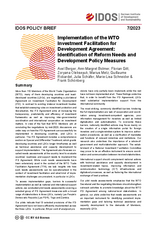Policy Brief
Implementation of the WTO Investment Facilitation for Development Agreement: identification of reform needs and development policy measures
Berger, Axel / Ann-Margret Bolmer / Florian Gitt / Zoryana Olekseyuk / Marius Metz / Guillaume Robardet / Julia Schäfer / Marie-Lisa Schneider / Frank SchönbergPolicy Brief (7/2023)
Bonn: German Institute of Development and Sustainability (IDOS)
DOI: https://doi.org/10.23661/ipb7.2023
More than 110 Members of the World Trade Organization (WTO), many of them developing countries and least-developed countries (LDCs), are negotiating a plurilateral Agreement on Investment Facilitation for Development (IFD). In contract to existing bilateral investment treaties that establish sweeping rules on investment protection and liberalisation, the IFD Agreement aims at increasing the transparency, predictability and efficiency of investment frameworks as well as improving inter-governmental coordination and international cooperation on investment matters. In view of the fact that WTO Members aim at concluding the negotiations by mid-2023, discussions are under way on how the IFD Agreement can successfully be implemented in developing countries, and LDCs in particular. The IFD Agreement includes a comprehensive section on Special and Differential Treatment, which grants developing countries and LDCs longer timeframes as well as technical assistance and capacity development to support implementation. The Agreement also foresees so-called needs assessments at the country level to evaluate countries’ readiness and support needs to implement the IFD Agreement. While such needs assessments have been extensively used in the context of the WTO Trade Facilitation Agreement (TFA), we lack insights into how such needs assessments can be operationalised in the context of investment facilitation and what kind of imple¬mentation challenges are prevalent, in particular in LDCs.
To assess implementation gaps, barriers to successful implementation as well as national and international support actions, we conducted pilot needs assessments covering a selected group of IFD Agreement measures with a broad range of stakeholders in three LDCs, namely Lao People’s Democratic Republic (Lao PDR), Togo and Zambia. Our pilots indicate that 13 selected provisions of the IFD Agreement have not been sufficiently implemented across the three LDCs. In particular, 64 per cent of analysed provisions have only partially been implement, while the rest have not been implemented at all. These findings underline that, in order to benefit from the IFD Agreement, LDCs need substantial implementation support from the international community. The most striking, commonly identified barriers hindering the full implementation are lack of cooperation and coordination among investment-competent agencies, poor information management for investors as well as limited digitalisation and automatisation. To overcome these barriers, nationally identified actions may focus mainly on the creation of a single information portal for foreign investors and a single-window system to improve authorisation procedures, as well as a clarification of mandates and functions of relevant ministries and institutions. Our research also underlines the importance of a whole-of-government and multi-stakeholder approach. The establishment of a National Investment Facilitation Committee may prove to be an effective instrument to ensure coordination and communication between involved stakeholders. International support should complement national actions with technical assistance and capacity development in investment-related topics, improving information and communication technology (ICT) infrastructures and digitalised processes, as well as fostering the international exchange of best practices. Our pilot needs assessments emphasise that the WTO Secretariat and the negotiating Members should strengthen outreach activities to promote knowledge about the WTO IFD Agreement among national-level stakeholders. In general, our pilots underline that needs assessments are an important instrument for identifying persistent implementation gaps and tailoring technical assistance and capacity development to the demands of Members, especially LDCs.
Kontakt
Cornelia Hornschild
Koordinatorin Publikationen
E-Mail Cornelia.Hornschild@idos-research.de
Telefon +49 (0)228 94927-135
Fax +49 (0)228 94927-130
Alexandra Fante
Bibliothekarin/Open Access-Koordinatorin
E-Mail Alexandra.Fante@idos-research.de
Telefon +49 (0)228 94927-321
Fax +49 (0)228 94927-130






